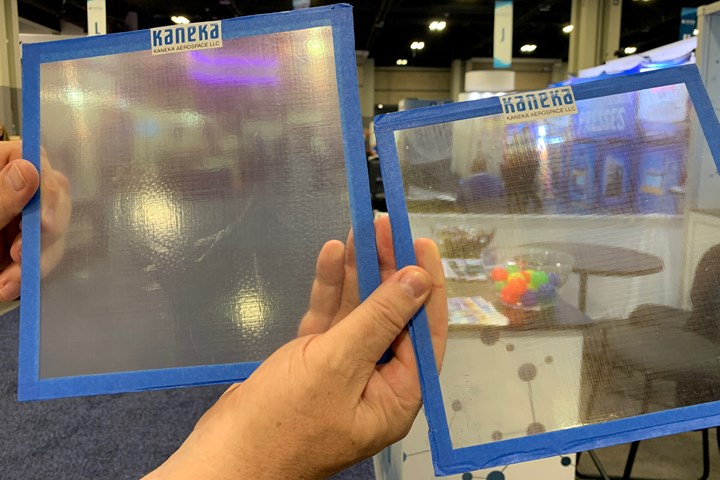AGY, Kaneka develop transparent fiber-reinforced composite
The S-2 Glass fiber/epoxy material offers tunable transparency, low haze, good impact and mechanical properties.

Two samples of AGY/Kaneka’s transparent epoxy/glass fiber composite. Transparency can be tuned by adjusting the chemistry of the epoxy. Photo Credit: CW
Glass fiber specialist AGY (Aiken, S.C., U.S.) and resins and chemicals specialist Kaneka Aerospace LLC (Benicia, Calif., U.S.) have announced the development of a transparent composite material that combines an epoxy-based resin system reinforced with an AGY continuous S-2 Glass fiber fabric.
Versions of the material developed so far are comprised of multiple plies of woven S-2 Glass yarns or rovings and feature high transparency, low haze and a high level of impact performance. Kaneka says the epoxy is a formulated resin that can be chemically tuned to change the refractive index of the resin to match that of the S-2 Glass fibers, which maximizes the transparency without significant reduction in mechanical properties.
The material is currently available for infusion only, but the companies report that a prepreg version is undergoing development and testing. Potential applications of the material include ballistic shields, machine guards or any part that requires a high level of transparency along with excellent impact performance.
For more information, contact Dr. Ekaterina Ryjkina, general manager of Kaneka Aerospace, or Iain Montgomery, global director of new business development at AGY.
Related Content
-
Cryo-compressed hydrogen, the best solution for storage and refueling stations?
Cryomotive’s CRYOGAS solution claims the highest storage density, lowest refueling cost and widest operating range without H2 losses while using one-fifth the carbon fiber required in compressed gas tanks.
-
Combining multifunctional thermoplastic composites, additive manufacturing for next-gen airframe structures
The DOMMINIO project combines AFP with 3D printed gyroid cores, embedded SHM sensors and smart materials for induction-driven disassembly of parts at end of life.
-
The lessons behind OceanGate
Carbon fiber composites faced much criticism in the wake of the OceanGate submersible accident. CW’s publisher Jeff Sloan explains that it’s not that simple.












